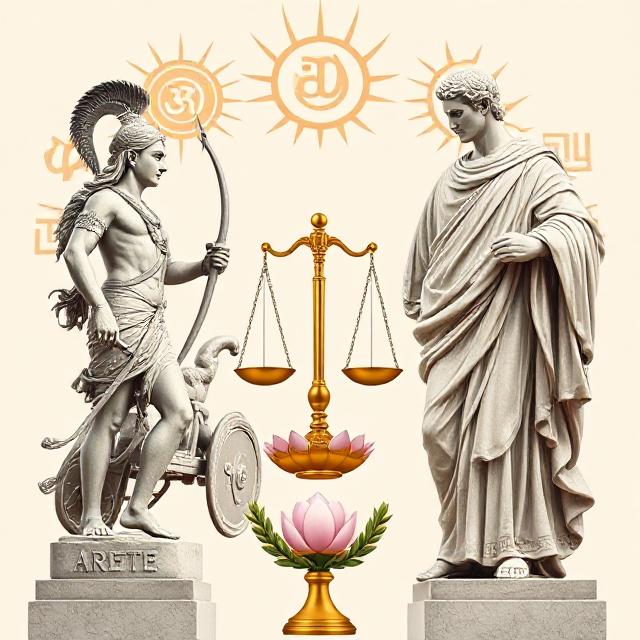
Table of Contents
Hindu Dharma vs Greek Arete: Two Visions of Virtue
Hindu Dharma vs Greek Arete is a philosophical juxtaposition that explores how ancient Indian and Greek traditions defined a meaningful life. Both systems emphasize the cultivation of virtue, yet they take radically different paths: Dharma focuses on one’s cosmic duty and role, while Arete emphasizes personal excellence and fulfillment of potential.
In this deep comparative essay, we will explore the roots of each term, their ethical implications, metaphysical backgrounds, and the way each still shapes how we think about morality, identity, and purpose.
I. What Is Dharma?
A. Etymology and Scope
The Sanskrit word dharma stems from the root dhri, meaning “to uphold” or “to sustain.” Dharma is that which upholds the universe, society, and the individual. It is not just law or duty—it is the essential nature of reality and one’s role in it.
B. Multiple Layers of Meaning
Dharma operates on many levels:
- Cosmic Dharma: The order of the universe (Rita).
- Social Dharma: One’s role according to caste (varna) and stage of life (ashrama).
- Personal Dharma: One’s inner conscience and unique calling (svadharma).
C. Dharma in the Bhagavad Gita
When Arjuna hesitates to fight in the Mahabharata, Krishna reminds him of his kshatriya dharma (warrior duty). This underscores a key idea:
Dharma is not about preference but purpose.
To follow dharma is to align with the moral structure of the cosmos, even when it’s difficult.
II. What Is Arete?
A. Origins in Homer and Plato
Arete (Greek: ἀρετή) means “excellence” or “virtue.” In Homer, it referred to martial prowess and heroic skill. By the time of Socrates and Plato, it evolved to mean the excellence of character and intellect.
B. Arete in Aristotle
In Nicomachean Ethics, Aristotle defines human arete as rational activity in accordance with virtue. It includes:
- Courage
- Temperance
- Justice
- Wisdom
Arete is achieved by developing habits through practice and aiming for the golden mean between extremes.
C. Purpose and Eudaimonia
For Aristotle, the highest goal is eudaimonia (flourishing or well-being), and arete is the path toward it. This view is highly individualistic: each person must cultivate excellence within their own nature.
III. Dharma vs Arete: Points of Contrast
| Element | Hindu Dharma | Greek Arete |
|---|---|---|
| Core Meaning | Duty, role, cosmic alignment | Virtue, excellence, personal flourishing |
| Ethical Focus | Fulfilling one’s ordained role | Perfecting one’s inner nature |
| Source of Morality | External order (cosmic law, tradition) | Internal development (reason, character) |
| Goal | Harmony with the universe | Realization of human potential |
| Spiritual Outlook | The self is bound to karma and rebirth | The self is a rational being seeking telos |
| Path | Social and ritual obligation | Philosophical inquiry and self-discipline |
While Dharma is rooted in interdependence and spiritual law, Arete celebrates individual mastery and intellectual cultivation.
IV. Can the Two Be Reconciled?
Though distinct, Dharma and Arete are not mutually exclusive. Both:
- Seek to answer: What does it mean to live rightly?
- Emphasize discipline and self-transformation
- Root their ethics in a vision of the human person
In a global context, the balance of duty to the world (Dharma) and development of the self (Arete) offers a profound model for wholeness.
A. Dharma in a Western Context
Modern yoga, mindfulness, and Ayurvedic ethics are expressions of Dharma interpreted through Western lenses. There’s a rising interest in purpose-based living over individualistic ambition.
B. Arete in the East
Many Eastern thinkers have embraced Aristotelian ideas through comparative ethics. Japanese Bushido and Confucian li echo the idea of cultivating personal virtue through practice.
V. Conclusion: Complementary Visions of the Good Life
Hindu Dharma vs Greek Arete represents two ancient but enduring visions of the moral life. One calls us to our place in the cosmic whole, the other urges us to cultivate inner excellence. Together, they frame a universal quest: how should we live?
Whether we follow the path of duty or excellence, both require us to step beyond selfish desires and into a deeper alignment with truth—be it cosmic or personal.